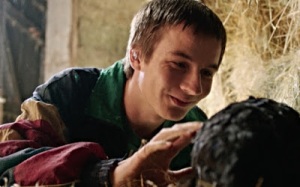Sean and I made the beautiful drive down to New England last Thursday for a long weekend of film festing in Portsmouth, New Hampshire. We also made a frenetic drive back on Sunday in order to cover a local happening (The Monster Pool Horror Anthology – review coming soon) last night and because today is election day here in Canada, and there’s no way we were missing that.
I’m finding that our coverage of the New Hampshire Film Festival is going to read a lot like a love letter to the city of Portsmouth. Home to about 21 000 residents, it’s bursting with  historical charm and significance. And I mean it’s just sick with quaintness. The downtown is distinctive and beautiful and eminently walkable. It feels cared for. And I suppose this is what has distinguished the New Hampshire Film Festival for me: it has a real sense of community. Don’t get me wrong, it’s attracting plenty of outside and international interest as well, and I think that trend will only continue as this little festival is landing some pretty major films. But each screening was attended by many locals who clearly took pride in this festival. We were greeted warmly everywhere we went. The volunteers were friendly. And though we found this festival to be well-organized and well-run, there was this pervasive feel of the insouciant. This is the laid-back film festival, perhaps a tribute to the unflappable New Englanders who have done an impressive job of making this look easy – and I tell you now, it is not. But the wrinkles, if there were any, were invisible.
historical charm and significance. And I mean it’s just sick with quaintness. The downtown is distinctive and beautiful and eminently walkable. It feels cared for. And I suppose this is what has distinguished the New Hampshire Film Festival for me: it has a real sense of community. Don’t get me wrong, it’s attracting plenty of outside and international interest as well, and I think that trend will only continue as this little festival is landing some pretty major films. But each screening was attended by many locals who clearly took pride in this festival. We were greeted warmly everywhere we went. The volunteers were friendly. And though we found this festival to be well-organized and well-run, there was this pervasive feel of the insouciant. This is the laid-back film festival, perhaps a tribute to the unflappable New Englanders who have done an impressive job of making this look easy – and I tell you now, it is not. But the wrinkles, if there were any, were invisible.
 Portsmouth bustles with tourists in the summer, but I think she may look her best in the autumn. Its historic seaport still sparkles, but I loved seeing leaves on the grounds of architectural highlights, including Colonial, Georgian, and Federal style homes. The city is replete with fall colours and decorative touches – it starts to feel like the set of an idyllic small-town, except when you sit down to eat, at which point it tastes like the very best of big-city eating.
Portsmouth bustles with tourists in the summer, but I think she may look her best in the autumn. Its historic seaport still sparkles, but I loved seeing leaves on the grounds of architectural highlights, including Colonial, Georgian, and Federal style homes. The city is replete with fall colours and decorative touches – it starts to feel like the set of an idyllic small-town, except when you sit down to eat, at which point it tastes like the very best of big-city eating.
 The seafood. We sampled local oysters from Franklin‘s, scallops from The District, and the best-ever clam chowder from Robert’s Maine Grill (Kittery, Maine being 2 minutes across the river). And don’t get me started on the lobster rolls. The movies at this point were incidental – this trip was already a culinary and sight-seeing success.
The seafood. We sampled local oysters from Franklin‘s, scallops from The District, and the best-ever clam chowder from Robert’s Maine Grill (Kittery, Maine being 2 minutes across the river). And don’t get me started on the lobster rolls. The movies at this point were incidental – this trip was already a culinary and sight-seeing success.
Okay, I’m lying. The movies are never unimportant. We’re Assholes: it’s what we do and why we came. We’ll get to those. First, though, the venues.
We rolled up to Discover Portsmouth Center first, a visitor center (this is me taking pains to spell centre the American way) extraordinaire. It’s a gallery, a gift shop, a museum, a gateway to the Black Heritage Trail – really the cultural heart of the city (which seems to have attractions worthy of a city many times its size), and also serves as the vital headquarters of the New Hampshire Film Festival, which is how it got to host a meet and greet with John Michael Higgins and Jimmy Dunn.
centre the American way) extraordinaire. It’s a gallery, a gift shop, a museum, a gateway to the Black Heritage Trail – really the cultural heart of the city (which seems to have attractions worthy of a city many times its size), and also serves as the vital headquarters of the New Hampshire Film Festival, which is how it got to host a meet and greet with John Michael Higgins and Jimmy Dunn.
Both of these fellows are New Englanders; Jimmy Dunn you’ll know as a stand-up comedian who also appeared on the sitcom The McCarthys, as Joey McIntyre’s (fraternal) twin brother. John Michael Higgins, as we’ve already covered, is an absolute favourite of mine because of his fantastic character s in many of Christopher Guest’s best (like Best In Show), but this guy gets hired for everything, from Pitch Perfect 2 to Broadway plays, to roughly half of all running sitcoms, including Arrested Development and Happily Divorced. More on them later (they were part of a lively and crazy-quotable comedy panel alongside Tom Bergeron and Juston McKinney).
s in many of Christopher Guest’s best (like Best In Show), but this guy gets hired for everything, from Pitch Perfect 2 to Broadway plays, to roughly half of all running sitcoms, including Arrested Development and Happily Divorced. More on them later (they were part of a lively and crazy-quotable comedy panel alongside Tom Bergeron and Juston McKinney).
On to our first film of the festival, Touched With Fire. This one screened at The Music Hall, which immediately requires me to derail this review in order to gush about the venue instead. It was recently declared an “American treasure” – and yes, it is. It’s a 900-seat theatre that you’ll immediately wa lk into and think: how dare you be so charming? It’ll make you think twice about ever setting foot into a dirty old Cineplex ever again, I’ll tell you that much. Built in 1878, it’s the oldest operating theater (American spelling!) in New Hampshire and the 14th oldest in the United States. It’s clearly been lovingly restored and it’s rocking character like a boss. It’s a venue-of-all-trades, home to intimate concerts (Suzanne Vega), readings (John Updike), and of course, independent cinema (we saw a poster for upcoming screenings of Grandma, a film which we
lk into and think: how dare you be so charming? It’ll make you think twice about ever setting foot into a dirty old Cineplex ever again, I’ll tell you that much. Built in 1878, it’s the oldest operating theater (American spelling!) in New Hampshire and the 14th oldest in the United States. It’s clearly been lovingly restored and it’s rocking character like a boss. It’s a venue-of-all-trades, home to intimate concerts (Suzanne Vega), readings (John Updike), and of course, independent cinema (we saw a poster for upcoming screenings of Grandma, a film which we heartily approve). The lobby makes a strong statement, and the auditorium is lovely, but it might just be an area usually unsung that wins you over: after using the facilities, Sean declared the washrooms to be “the best ever” and insisted that I had to pee. I have never heard Sean remark upon washroom facilities in my life, and am usually skeptical about any men’s room, but when I visited the ladies’ quarters, I saw instantly what he was talking about, and they ARE magnificent. Obviously, we Assholes are in the business of reviewing movies, not restrooms, but just to prove to you we’re not nuts, appreciation for these washrooms is such that they’re actually nominated for Best Restroom literally in all the land, and I urge you
heartily approve). The lobby makes a strong statement, and the auditorium is lovely, but it might just be an area usually unsung that wins you over: after using the facilities, Sean declared the washrooms to be “the best ever” and insisted that I had to pee. I have never heard Sean remark upon washroom facilities in my life, and am usually skeptical about any men’s room, but when I visited the ladies’ quarters, I saw instantly what he was talking about, and they ARE magnificent. Obviously, we Assholes are in the business of reviewing movies, not restrooms, but just to prove to you we’re not nuts, appreciation for these washrooms is such that they’re actually nominated for Best Restroom literally in all the land, and I urge you  to vote now (until October 31st) – even if you haven’t peed there yourself, you can take my word for it, I promise. (I was too shy to snap a photo, but thanks to braver souls and the Internet, check em out!)
to vote now (until October 31st) – even if you haven’t peed there yourself, you can take my word for it, I promise. (I was too shy to snap a photo, but thanks to braver souls and the Internet, check em out!)
So, here we are: a thousand words about the New Hampshire Film Festival, and still not a single movie review. It’s your fault, Portsmouth, for being a unique place to discover and enjoy in your own right. You don’t need a film festival to earn tourists, but I’m sure as heck glad you have one, because not only were we impressed by your lineup this year, we can’t wait to come back and do it again in 2016.
NHFF screened something in the neighbourhood of 100 movies, and like any festival, you can’t see ’em all. We missed some with regret but regretted none we saw, and I guess that’s the greatest compliment you can pay a festival. Our selections:
Touched With Fire
The Preppie Connection
The Second Mother
Experimenter
A Light Beneath Their Feet
Bridgend
Chicken
Mississippi Grind
The Witch
Check back for more coverage of NHFF including the comedy panel and the red carpet, and for reviews for each of the films.
 died – not just the apartment, in fact, but the building, which includes Leonor’s (Tony’s mom) store. Brian’s sister is demanding her fair share, and that means increasing Leonor’s rent, which has languished very generously far below market price for years. She can’t afford to pay the higher rent and insists that Brian’s father wanted her there. Brian is pulled by his sister, who is rightfully wanting her share of the inheritance, and his wife who supports the family herself (what little acting work he gets doesn’t pay much).
died – not just the apartment, in fact, but the building, which includes Leonor’s (Tony’s mom) store. Brian’s sister is demanding her fair share, and that means increasing Leonor’s rent, which has languished very generously far below market price for years. She can’t afford to pay the higher rent and insists that Brian’s father wanted her there. Brian is pulled by his sister, who is rightfully wanting her share of the inheritance, and his wife who supports the family herself (what little acting work he gets doesn’t pay much).




























